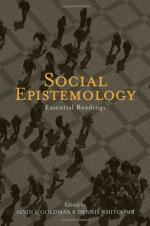|
This section contains 444 words (approx. 2 pages at 300 words per page) |

|
A "subjectivist epistemology" is one that implies the standards of rational belief are those of the individual believer or those of the believer's community. Thus, subjectivism can come in either an individualistic form or a social form. A key negative test of subjectivism is whether an account implies that by being rational one is assured of having beliefs that are more reliable than they would be otherwise—that is, more reliable than they would be if one were not rational. Thus, reliabilist accounts of rational beliefs are paradigmatically objective. So are traditional foundationalist accounts. By contrast, if an account implies that the standards one must meet if one's beliefs are to be rational are those that one would regard as intellectually defensible were one to be ideally reflective (Foley 1987, 1993), then the account is subjective. Similarly, an account is subjective if it implies that one's beliefs are...
|
This section contains 444 words (approx. 2 pages at 300 words per page) |

|


